| Columns Retired Columns & Blogs |
Beautiful coverage and pictures- TC.
Always great to see Brad, Branford and Fred on the Jazz scene.
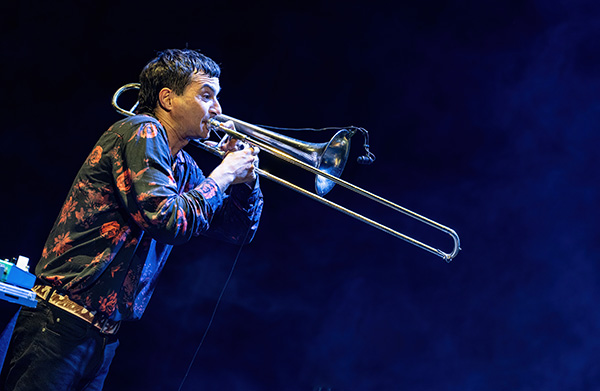
This year's festival provided further confirmation that the leading jazz scene outside the United States is Italy. Many of the best Italians were there: Enrico Rava. Paolo Fresu. Fabrizio Bosso. Gianluca Petrella. Flavio Boltro. Stefano di Battista. Enrico Morello. And that is before we get to the piano players. The greatest strength of the Italian jazz scene is pianists. The top four are Stefano Bollani, Enrico Pieranunzi, Danilo Rea, and Dado Moroni.
But one searches in vain for Italian names in the 71st DownBeat Critics Poll. The almost complete absence of Italians speaks volumes about the ethnocentrism of the American jazz community and its ignorance about jazz beyond its borders. In addition to its possible utility as a jazz travelogue, this article aspires to chip away at that ignorance.
Enrico Pieranunzi is the oldest (73) of the four greatest living Italian pianists, with the largest body of work. Like so many European jazz pianists, he started in classical music. He has recorded albums of improvisations on Scarlatti sonatas. But he chose jazz as his calling in his early 20s.
Over the years, he has collaborated with a long list of important Americans. The one who changed his life was Chet Baker. He met Baker in 1979 and worked with him on and off through the '80s. Everyone who ever worked with Baker worked with him "on and off " because he was a notoriously unreliable drug addict. But if Pieranunzi was ever made to suffer by Baker's bad behavior, he doesn't talk about it. He reveres Baker's memory. He has said that Baker "permanently altered" his own playing and instilled in him a "first belief in lyricism."
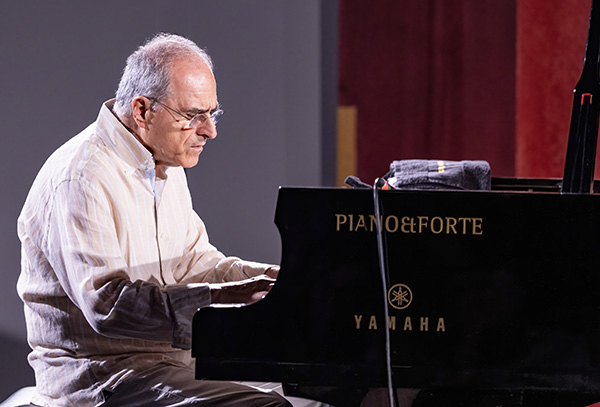
Pieranunzi played a solo recital in Sala Podiani. With a capacity of 150, it was the most intimate of the festival's primary venues and was nearly always sold out. An accomplished composer, Pieranunzi played almost exclusively originals. They all sounded vaguely familiar, not because you had heard them before but because their inevitable melodies seemed to already exist somewhere in your musical subconscious. In an interview after his concert, Pieranunzi said, "When you play an original that you have played many times, but the people don't know, you have to make sure to tell a story. In jazz, interpretation is as important as composition. Maybe more. Chet Baker wrote very few tunes in his life, but anything he played became his own song. I think interpretation is an underrated aspect of jazz today. There aren't so many storytellers left."
When he played originals like "Flowering Stones" and "Molto Ancora," their stories were implicit in their plaintive melodies, which kept emerging in myriad permutations, through improvisation. And when he played standards like "Yesterdays" and "Everything I Love," he (like Chet Baker) made them his own, with new harmonies and personal interpretations of their enduring melodies.
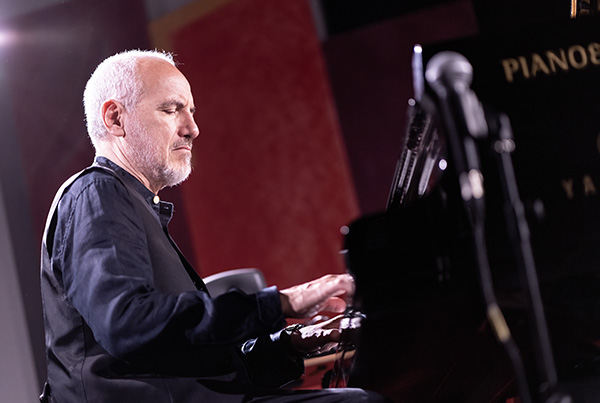
Danilo Rea also performed solo in Sala Podiani. When Enzo Capua introduced him, he called Rea the "grandissimo melodista." A Rea solo recital is an unbroken, spontaneous, stream-of-consciousness outpouring. The first song he played was Sting's "Englishman in New York." In an interview later that day, he said that he had never played it before but had heard it on the radio that morning. To say that Rea "plays songs" is imprecise. In his extemporaneous creative process, in his flow of the moment, he comes upon them. Sometimes he barely brushes against a known melody; sometimes he lingers. Songs provoke other songs, in a suite that connects touchpoints of memory.
In two hour–long concerts, Rea never stopped to think and never repeated a song. For an American like me, the second show was best because it contained more tunes I knew. "Moon River" became "The Man I Love" became "As Time Goes By" became "When You Wish Upon a Star" became Carole King's "You've Got a Friend." Rea told me that his piano teacher at the Santa Cecilia conservatory in Rome, Liliana Vallazza, always demanded that he think about "il suono"—the sound. Rea is a rare jazz pianist who gets his own suono from a piano. He makes the instrument sing. Leonard Cohen's masterpiece "Hallelujah" has been covered by many singers. Its lyrics are epic. Rea sang it on the piano, without words. He fully rendered its inherent drama. He filled Sala Podiani with the suono of Leonard Cohen's song.
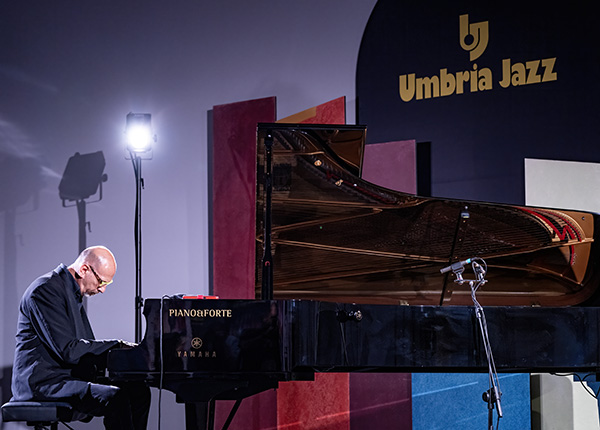
Dado Moroni is a different Italian pianist. He did not start in classical music and is not conservatory-trained. He is self-taught and does not read music well. But his chops are electric. Few living piano players can knock you back in your chair like Moroni can. He is by far the "most American" of the four pianists under discussion. His primary influence is probably Alfred McCoy Tyner. In his solo performance in Sala Podiani, you could sometimes hear Tyner in Moroni's thundering left-hand chords and hurtling right-hand runs. One of the pieces he played was his own "Brother Alfred," which is dedicated to Tyner. Like Tyner's, Moroni's playing contains a spiritual power that makes many fine pianists sound somewhat prissy.
In a different respect, Moroni is fully representative of Italian pianists. For all his aggressive force, he is still a shameless romantic. The great moment in his concert was "My Foolish Heart." It was composed by Victor Young and Ned Washington, but Bill Evans has owned it forever. It is brave for any other pianist to undertake it. Moroni broke your heart with it. His free-flowing elaborations always eventually acquiesced to the irresistible pull of the song.
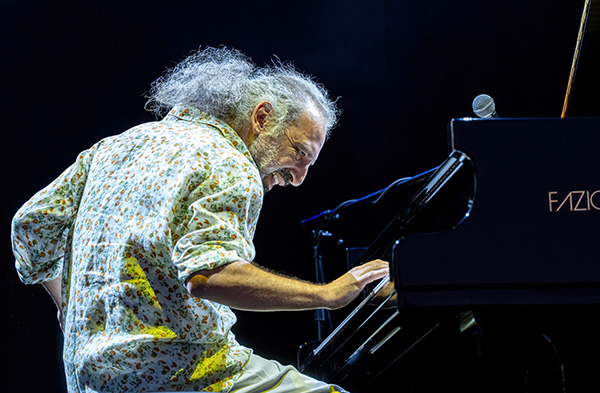
By broad consensus, Stefano Bollani is the greatest pianist in Italy. (He is one of the greatest anywhere, a fact that you would not glean from the DownBeat Critics Poll, which ignored him.) To find comparisons to Bollani's level of keyboard mastery, you have to go to Keith Jarrett and Brad Mehldau, or further back to Oscar Peterson. In Italy, he is a superstar. He did not appear in Sala Podiani, but in Arena Santa Giuliana. With just his piano, solo, he came close to filling it.
Perhaps the most jaw-dropping performance in Bollani's long concert was "All the Things You Are." Jerome Kern's song often stimulates jazz musicians to go for broke, perhaps because of its harmonic erudition and challenging modulations. Bollani incinerated it. He exploded it, at a velocity that rendered unnecessary all future attempts to display technical virtuosity based on "All the Things You Are."
Bollani is a Renaissance Man. He writes books. He composes film scores. With his wife, actress Valentina Cenni, he hosts a popular variety show on Italian television. He has collaborated with many artists outside jazz and even outside music. He is also a comic. If he chose, he could probably make a living as a stand-up comedian.
Unlike the other preeminent pianists to whom he is compared, Bollani has never sustained a working band. The closest he has come is his "Danish Trio," with bassist Jesper Bodilsen and drummer Morten Lund. But they have toured intermittently and recorded only three albums. In an interview before his concert in the arena, he said (in the perfect English of an Italian Renaissance Man), "I've been playing music since I was six. Mainly, I don't want to be bored by myself. So that's the reason I keep changing the ambience around me. A second reason is curiosity. A third reason is that every artist has something to teach me. It's good for me to play with as many as possible."
His curiosity, and the enormous range of his interests, may have become a limiting factor in his career. Rather than fully developing his art within a stable group (as Keith Jarrett did; as Bill Evans did), he is forever moving on to the next project. Another limiting factor is his apparent desire to become a mass entertainer. In the arena, he sang Bob Dylan's "Rainy Day Women #12 & 35." The crowd loved it and sang along when he belted out the refrain, "Everybody must get stoned!" He brought his wife on stage and sang with her, too. (Singing is one of the few things he does not do well.) He sometimes alternated piano playing with stand-up comedy. At the end, he trotted out a parlor trick (a parlor of 4000 people in this case) that he has used for years. He invited the audience to shout out suggestions for tunes to play in an encore, from which he assembled a playlist. He was very funny, often ridiculing song requests. Then he played a wildly miscellaneous, schizophrenic, bombastic, virtuoso encore. It was (as it always is) hilarious. But it would be a loss for jazz if Bollani turned himself into a latter-day Victor Borge or, worse, a Liberace.
Another piano player at the festival turned heads. He is not well known and did not appear as a leader. Julian Oliver Mazzariello played in the band of Fabrizio Bosso. Many Italian critics think Bosso is the most technically gifted trumpet player in Italy, and he was on fire in the Morlacchi. But every time Mazzariello soloed, he introduced into the evening a second aesthetic dimension that expanded upon Bosso's more orthodox expertise. Some of Mazzariello's solos were rhapsodic. Some were stark, in block chords. Some were slow unfoldings, like the one on "For Heaven's Sake."
Later that night, Mazzariello showed up at the jam sessions that sometimes went until five in the morning, in Taverna 36, a club off Corso Vannucci. Given an opportunity to stretch out, he revealed more aspects of his creativity.
In an interview between the Morlacchi concert and the jam session, Mazzariello provided some details from his rather unusual biography. He was born in the UK to an English mother and an Italian father. His parents divorced, and at 17, Mazzariello moved to Italy to live with his father. He said, "It was like starting my life over." He lived near Salerno, on the Amalfi Coast. It had a little jazz scene, into which Mazzariello immersed himself.
He is now 44 and has worked with prominent Italians like Stefano di Battista and Mario Pia De Vito. We live in an era when most jazz musicians record sooner and more often than they should. It is therefore striking that Mazzariello did not make an album under his own name until he was 40. Debut was released in 2018. Reflections came in 2021. He said, "I was terrified to do them. I'm not really happy with them." But both reveal a fully formed, distinctive piano voice. On moving solo ballads like "Over the Rainbow" and "Body and Soul," Reflections demonstrates that Mazzariello has the rare gift that Enrico Pieranunzi spoke about: He is a storyteller. Clearly, he is his own harshest critic and is not inclined toward self-promotion. But he needs to make more records. One hopeful sign: He has said, "I formed a little trio about six months ago, doing Monk music. We have a repertoire of about 12 Monk tunes. I wouldn't mind recording that one day."
It is yet another testament to the strength of the Italian jazz scene that musicians as talented as Julian Oliver Mazzariello can lurk under the radar.

Beautiful coverage and pictures- TC.
Always great to see Brad, Branford and Fred on the Jazz scene.

I’m always trying to expand my musical horizons, and from the writeups and recommendations, it seems I might be doing some of that expansion very soon.